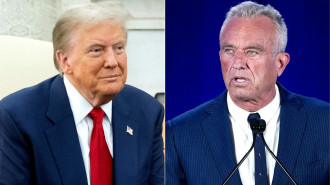Syria opposition, Turkey reject discussing Russian-proposed constitution
Syria's main opposition groups and Turkey on Friday rejected discussing the future administrative make-up of Syria or a new constitution at talks aiming to end the civil war, a Turkish foreign ministry source said.
The ministry's number two Umit Yalcin hosted Syrian political opposition groups, as well as representatives of armed rebel factions at a meeting in Ankara ahead of new peace talks later this month.
The opposition took part in talks in the Kazakh capital Astana last month brokered by Russia and Turkey, whose differences on the civil war have narrowed in recent months despite Moscow backing Syrian President Bashar Assad and Ankara the rebels.
At those talks, Russia gave the rebels a draft version of a new Syria constitution and the blueprint has been promoted by Moscow as offering a possible solution to the conflict.
But a Turkish foreign ministry source said that at the Ankara meeting "all participants pointed out that bringing up the future administrative system of Syria... and attempting to start a discussion on issues such as a new constitution, autonomy or federalism... risk serving the purposes of those who pursue unilateral agendas."
New talks backed by the United Nations are scheduled in Geneva on February 20 but the source said groups pursuing unilateral agendas "at the expense of the territorial integrity of Syria" should have no place at the table.
Turkey is wary of any proposal to split Syria into federations, especially including a Kurdish entity in the northeast.
A fragile ceasefire brokered by Turkey and Russia between rebels and the regime has largely held since December. But the source said all sides denounced "unacceptable" violations of the ceasefire and acquisitions of territory by the regime.
They also warned against the presence of "fake opposition" at the talks, a reference to groups deemed by Turkey to be too loyal to Assad favored by Moscow.
The meeting was attended by the key players that Turkey has supported in the conflict, including Riad Hijab, head of the High Negotiation Committee and Syrian National Coalition head Anas al-Abdeh.
Also in attendance were members of the pro-Ankara Syrian Turkmen Assembly representing the Turkmen minority, and the Kurdish National Council which Ankara favours over the Democratic Union Party (PYD) which it considers to be a terror outfit.
There was no information on which armed factions were present.







 Follow the Middle East's top stories in English at The New Arab on Google News
Follow the Middle East's top stories in English at The New Arab on Google News
![The new film casts Israeli actors to tell the story of Mary while leaving out Palestinians [Getty]](/sites/default/files/styles/image_330x185/public/2024-11/GettyImages-2172155541.jpg?h=199d8c1f&itok=wJWyXDEQ)
![Ben & Jerry's has taken Unilever to court for its alleged attempts to silence it [Getty]](/sites/default/files/styles/image_330x185/public/2024-11/GettyImages-2183900214.jpg?h=199d8c1f&itok=jEcYtQ64)
